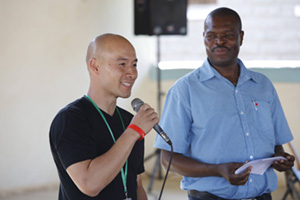 Hiring right is every recruiter’s ultimate dream. Unfortunately, it is easier said than done. The whole process is often complex and confusing. What adds to the complexity is the myriad of tips provided by so-called hiring experts. Every “expert” has their own views on sourcing, screening, interviewing and hiring. Listening to two or more experts can often lead to confusion rather than clarity.
Hiring right is every recruiter’s ultimate dream. Unfortunately, it is easier said than done. The whole process is often complex and confusing. What adds to the complexity is the myriad of tips provided by so-called hiring experts. Every “expert” has their own views on sourcing, screening, interviewing and hiring. Listening to two or more experts can often lead to confusion rather than clarity.
What every recruiter secretly wishes for is a simple, foolproof criterion which works in every hiring situation. Given that every hiring situation is different, finding such a criterion seems daunting.
Warren Buffet, the renowned billionaire, offered the following life quote which could provide direction for the hiring template. “Look for three qualities in a person – intelligence, energy and integrity. If they don’t have the last one, don’t even bother with the first two.”
A candidate who scores poorly on any of these qualities will be a liability to the organization in one way or another. RecruiterBox perfectly maps out these deficiencies in the following article: http://recruiterbox.com/blog/what-warren-buffett-wants-to-know-before-he-hires-you/. Mr. Buffet identified the criteria behind his quote.
- A person with low integrity, high intelligence and high energy is most likely to be a smart, smooth-talking, and fast-moving swindler or thief.
- A person with low energy, high intelligence and high integrity is most likely to be a drag, who isn’t a self-starter and thus cannot be an engine for growth.
- A person with low intelligence, high integrity and high energy will make a good functionary, but lack creativity and problem-solving capabilities.
Basically, the best hire should have the right balance of all these three qualities. This means that during the hiring process, a recruiter should test for these three qualities in order to ensure that they are hiring the right person.
1. Integrity
This is the first quality mentioned by Mr. Buffet. And for good reason, it is the one quality on which there can absolutely be no compromise. An employee without integrity is one who cannot be trusted with company information. He/she could put the employer and the organization at risk.
Unfortunately, integrity isn’t an easy test. The best way is through conducting a comprehensive background check. The first step is by verifying everything which is indicated in the candidate’s résumé. It is no secret that people often lie in their résumés. This should be a red flag right from the beginning.
The next step is by contacting former employers and carrying out a character audit on the candidate. People who are crafty often leave a trail of complaints about their behavior from superiors, colleagues and subordinates. It should be noted that often employers are not required to offer subjective information but can certainly verify employment dates, attendance and the employees title.
2. Intelligence
This is actually the easiest quality to measure. Ironically, it can be the most difficult quality to accurately assess. The reason for this is simple: there are different kinds of intelligence. Also, being intelligent in the technical aspects of the job doesn’t necessarily mean that a person is well suited for the job.
Let’s take computer programming for instance. One person can be a genius at coding but lack writing and communication skills. Another can have moderate coding skills but be a genius at dealing with people. When hiring a programmer, the first person may make a better choice. However, when hiring someone to lead a team of programmers, the second person may make a better choice.
The bottom line is that measuring intelligence isn’t as straightforward as it seems. It is important to first define what “intelligence” means in the context of the job. Only then can tests be designed which accurately measure whether a candidate has the job required intelligence or not. Generally speaking, there are different kinds of tests which can be used to gauge intelligence. Right from the interview room, the way candidates answer questions can give insights into their intelligence. Recruiters can also use games, puzzles and simulated work scenarios to test for problem solving, ingenuity and strategic thinking.
3. Energy
Most people equate energy with being outgoing, exuberant and fast-talking. Granted, such qualities may be necessary for certain jobs e.g., sales and marketing. However, the kind of energy which organizations often need is mental energy.
A person with mental energy is mentally alert, always thinking and capable of maintaining sharp mental focus. These are the kinds of employees who will come prepared for meetings, remain active and actually have something to contribute.
Apart from mental energy, organizations also need physical energy. A person with physical energy is capable of putting in a good shift, especially on a long, tedious working day. Such energy is contagious not only to co-workers but also clients.
How a person answers interview questions can provide clues as to their level of mental energy. A person’s energy level can be spotted by body language and dialogue.
Another great way of gaging energy levels is past accomplishments. High energy people tend to be active. Even those coming fresh out of school will have a string of accomplishments such as leadership positions held, community activities participated in and even personal projects completed.
In summary, there are three basic qualities which every right hire, irrespective of the job, should have. These are integrity, intelligence and energy. Therefore, any recruiter who desires to hire the right person should focus on assessing these qualities of their future employees.






 The legendary former CEO of General Electric, Jack Welch, famously said: “There’s no such thing as work-life balance. There are work-life choices, you make them, and they have consequences.” Mr. Welch’s words seem to run counter to one of the most popular ideas in the modern workplace, the idea that it is possible to achieve the perfect balance between workplace and personal life. The assumption is that if people can strike the perfect balance between their personal and work lives, they will be happier and more fulfilled. Happier people not only make more productive employees; they are also make better members of a society. So, the idea of a work life balance seems beneficial all round. The only problem is that work-life balance is an often unattainable ideal. As such those who go in pursuit of it often end up getting frustrated. They end up feeling guilty, powerless and angry. In the end, the pursuit of work-life balance often leads to frustration, unhappiness and stress, the opposite of what it is intended to achieve.
The legendary former CEO of General Electric, Jack Welch, famously said: “There’s no such thing as work-life balance. There are work-life choices, you make them, and they have consequences.” Mr. Welch’s words seem to run counter to one of the most popular ideas in the modern workplace, the idea that it is possible to achieve the perfect balance between workplace and personal life. The assumption is that if people can strike the perfect balance between their personal and work lives, they will be happier and more fulfilled. Happier people not only make more productive employees; they are also make better members of a society. So, the idea of a work life balance seems beneficial all round. The only problem is that work-life balance is an often unattainable ideal. As such those who go in pursuit of it often end up getting frustrated. They end up feeling guilty, powerless and angry. In the end, the pursuit of work-life balance often leads to frustration, unhappiness and stress, the opposite of what it is intended to achieve.







